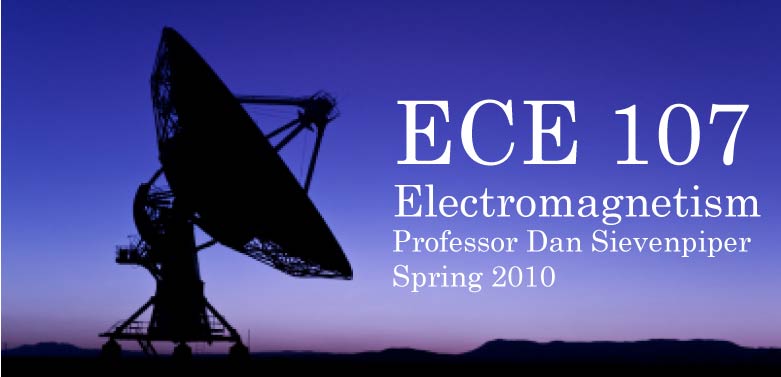Lectures
Lecture 1 - Electric and magnetic fields, waves, complex numbers, phasors
Lecture 2 - Lumped element model, transmission line equations
Lecture 3 - Propagation, reflection coefficient, wave impedance
Lecture 4 - Special cases of lossless lines, power flow
Lecture 5 - The Smith chart
Lecture 6 - Impedance matching
Lecture 7 - Vectors, orthogonal coordinate systems, transformations
Lecture 8 - gradient of scalar field, divergence, curl, Stoke’s theorem, Laplacian operator
Lecture 9 - Maxwell's equations, charge & current distributions, Coulomb's, Gauss's laws
Lecture 10 - electric potential, conductors, dielectrics
Lecture 11 - electric boundary conditions, capacitance, potential, image method
Lecture 12 - magnetic forces, Biot-Savart law
Lecture 13 - magnetostatic eq., Ampere's law, vector magnetic potential, materials
Lecture 14 - boundary conditions, inductance, magnetic energy
Lecture 15 - Faraday's law, transformers
Lecture 16 - generators, displacement current, continuity, potentials
Lecture 17 - time harmonic fields, propagation in lossless media
Lecture 18 - polarization
Lecture 19 - propagation in lossy media, current flow in conductors, power density
Lecture 20 - electromagnetic waves at boundaries, Snell's laws, optical fibers
Lecture 21 - reflection and transmission at oblique incidence
Lecture 22 - waveguides, resonators
Lecture 23 - antennas, Hertzian dipole
Lecture 24 - antenna characteristics
Lecture 25 - half-wave dipole, effective area, Friis transmission formula
Lecture 26 - review for final
